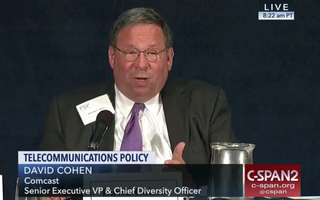Comcast's Cohen Sees Way to 'Yes' on Paid Prioritization Compromise

Paid prioritization has become the third rail of net neutrality discussions, Comcast senior EVP David Cohen told a Free State Foundation Summit crowd in Washington this week, but it should not be.
Cohen said he has had conversations with his industry, with tech companies and the Cisco’s of the world about the possibility of agreeing to a prohibition on paid prioritization with a limited exception for specialized services that do not travel on the public internet, though he said that was not an official Comcast proposal.
He pointed out that such specialized services were allowed in the FCC's 2010 Network Neutrality Order, and at least a form of which made into FCC chair Tom Wheeler's 2015 order, which the Ajit Pai FCC voted last December to, in effect, repeal.
He said there has been a recognition that "something might come along that is not anticompetitive, that is pro-consumer, and that is a specialized service not available to every user of the internet that would be in the public interest."
He said the paid prioritization/specialized service example, which he raised at last week’s American Cable Association conference in Washington, was about what could happen if people sat down to talk about the issue rather than playing politics with it.
His point was that there was a conversation to be had about pro-consumer, non-anticompetitive services if folks would get past the politics.
Related: AT&T Says VR Is Paid Prioritization Beneficiary
Broadcasting & Cable Newsletter
The smarter way to stay on top of broadcasting and cable industry. Sign up below
"If rational people will sit down and talk about this, they can even resolve what has become a third rail around bipartisan network neutrality legislation," he said. He noted that Rep. Greg Walden (R-Ore.), chairman of the House Energy & Commerce Committee floated network neutrality legislation that included an absolute ban on paid prioritization and was yet to have any Democrat be willing to discuss it.
Chris Lewis, VP at Public Knowledge, who joined Cohen on a panel at the Foundation event, said the Dems problem with the Walden bill was that it narrowed the FCC's authority to those specific things, and that the more current Republican bill, from Communications Subcommittee chair Marsha Blackburn (R-Fla.), did not include a ban on paid prioritization.
He also said there was a difference between allowing reasonable network management to prioritize, say, real time video for remote surgery, that was different from an ISP degrading or slowing a service it did not own. He said there needed to be a cop on the beat and rules.
Contributing editor John Eggerton has been an editor and/or writer on media regulation, legislation and policy for over four decades, including covering the FCC, FTC, Congress, the major media trade associations, and the federal courts. In addition to Multichannel News and Broadcasting + Cable, his work has appeared in Radio World, TV Technology, TV Fax, This Week in Consumer Electronics, Variety and the Encyclopedia Britannica.

